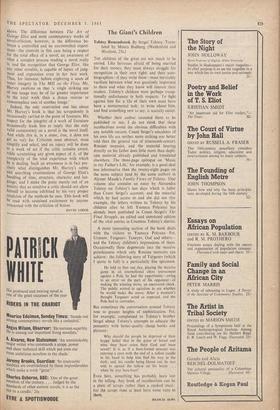The Giant's Children
THE children of the great are not much to be envied. Like heiresses afraid of being married for their money, they must always struggle for recognition in their own right; and their auto- biographies—if they write them—must inevitably vacillate between what was genuinely important to them and what they know will interest their readers, Tolstoy's children were perhaps excep- tionally unfortunate in both respects. To fight against him for a life of their own must have been a monumental task; to write about him, and find something new to say, is scarcely easier.
Whether their author intended them to be published or not, I do not think that these recollections avoid the obvious difficulties with any notable success. Count Sergei's anecdotes of his own life are neither more striking nor better told than the general run of nineteenth-century Russian memoirs, and the material bearing directly on his father does little more than dupli- cate material already published and translated elsewhere. The three-page epilogue on 'Music in my Father's Life,' for example, is a good deal less informative than the twenty-eight pages on the same subject (and by the same author) in Alymer Maude's Family Views of Tolstoy. That volume also contains an essay by Alexandra Tolstoy on Tolstoy's last days which is fuller than Count Sergei's account; and the material which he had access to and she did not (for example, the letters written to Tolstoy by his children after he left Yasnaya Polyana) has already been published in Count Sergei's The Final Struggle, an edited and annotated edition of the vital entries in Countess Tolstoy's diaries.
A more interesting section of the book deals with the visitors to Yasnaya Polyana—Fet, Urussov, Turgenev, Taneyev, Gue and others— and the Tolstoy children's impressions of them. Occasionally these degenerate into the massive pointlessness which only Russian memoirs can achieve: the following story of Tdrgenev (which I quote in full) is a particularly fine specimen.
He told its that one day, playing the decisive game in an international chess tournament against a Pole, he had the opportunity—owing to an error on the part of his opponent—of making the winning move, an uncovered check. The public waited in agitation to see. whether he would make the move. After a moment's thought Turgenev acted as expected. and the Pole had to surrender.
But sometimes the conversation around Tolstoy rose to greater heights of sophistication. Fet, for example', complained to Tolstoy's brother Sergei about Tolstoy's attempts to educate the peasantry with better-quality cheap books and pictures:
Why should the people be deprived of their happy belief that in the guise of bread and wine they have eaten their God and been saved? It is as if a bare-footed peasant was entering a cave with the end of a tallow candle in his hand to help him find his way in the - dark; and, his candle being blown out, he was told to spread the tallow on his boots . when he was bare-foot!
Even here, something has probably been lost in the telling. Any book of recollections can be a plate of scraps rather than a cooked meal : but the scraps must at least have some taste to them.
FRANCIS HOPE






































 Previous page
Previous page